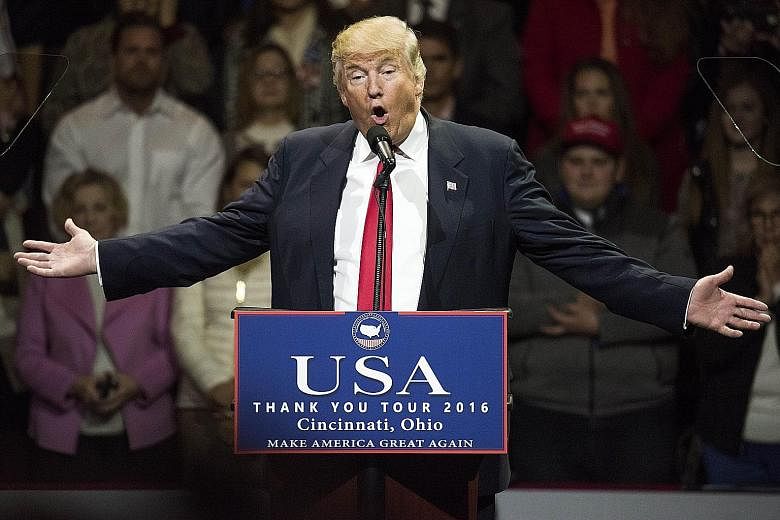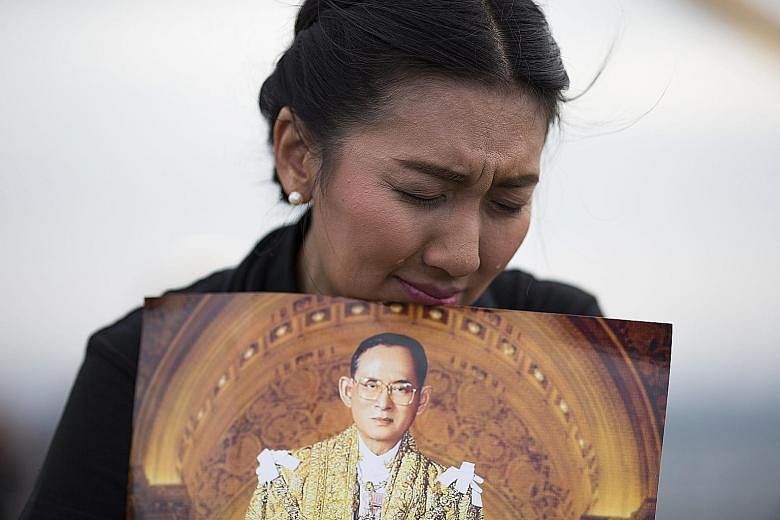When real estate mogul Donald Trump takes the oath of office on Jan 20, it will be the culmination of the most disruptive election campaign in American history.
The 70-year-old's path to the White House is strewn with the bodies of conventional wisdom, political tradition and historical precedent.
Only once before has a candidate with no experience either in the military or public office ever won the nomination of a major political party. And never before has one actually won the election. Utility company executive Wendell Wilkie ran on the Republican ticket in 1940, but lost badly to Franklin Roosevelt.
But Mr Trump won this year while wreaking havoc on all established ideas about what it takes to win an election and making a host of controversial remarks that would have disqualified a more conventional candidate. But perhaps most importantly, his greatest disruption this year was to see and tap into an anti-establishment sentiment among the American working class that few others understood.
Time magazine said it chose the billionaire as its Person of the Year for "empowering a hidden electorate by mainstreaming its furies and live-streaming its fears, and for framing tomorrow's political culture by demolishing yesterday's..."
And after the established order in US politics was unceremoniously upended, many are now looking to see what sort of impact Mr Trump will have on the world. Thus far, the signals from his campaign and transition team have raised some alarm.
At the heart of the concern is the potential disruption from Mr Trump's repeated mantra of an "America First" approach to the world. Though a rise in nationalism and isolationism is not a uniquely American phenomenon, the endorsement of it by a country the size of the United States could have far-reaching effects.
If the US is largely credited with laying the foundation of globalisation, Mr Trump's remarks suggest that the country might soon want to turn its back on it.
Mr Trump's America is not necessarily one that sees itself as a keeper of international order and peace, or at least not without getting compensated for it accordingly.
He has often raised questions about the US' commitment to the North Atlantic Treaty Organisation, and said that the likes of Japan and South Korea need to pay more for the defence the US provides.
His phone call with Taiwan's President and subsequent questioning of the US commitment to a "one China" policy also suggest a volatile approach to foreign policy that will keep foes and allies on their toes.
Similarly, Mr Trump's promises of tearing up trade deals suggest a belief that trade is not an activity that could benefit all, but a game where the winner triumphs over the loser.
Reneging on deals signed, such as the Paris Climate Agreement and the Iran nuclear deal, would also threaten to undermine US credibility as a negotiating partner in the future as well as its standing as a defender of an international rules-based order. It would, in the eyes of foreign policy experts, be a stunning disruption indeed.
End of a chapter for Thailand
KING BHUMIBOL ADULYADEJ
BANGKOK • Thailand turned the page on a 70-year chapter on Oct 13, when 88-year-old King Bhumibol Adulyadej died in Bangkok's Siriraj Hospital.
With it, the nation lost a revered and unifying figure whose stature had only grown through decades of political turbulence and coups.
Thrust onto the throne at the age of 18 in 1946, King Bhumibol acquired moral authority by improving rural livelihoods and publicly intervening against unpopular military dictators.
His death turned a colourful nation monochrome overnight, as billboards went silent and people were asked to refrain from entertainment for 30 days.
Amid widespread grieving, his son Maha Vajiralongkorn took a seven-week pause before ascending the throne. With Thailand under firm military rule, the 64-year-old King Rama X included three junta- linked men in his Privy Council. But he has also kept 96-year-old former prime minister Prem Tinsulanonda as Privy Council president, signalling some continuity.
The government is closely watching for any insult or defamation of royalty. Two days after the King ascended the throne, an anti-junta activist was arrested for allegedly sharing on Facebook a biography of the new monarch.
Tan Hui Yee
Maverick leader shakes up nation
RODRIGO DUTERTE
MANILA • The Philippines has not been the same since Mr Rodrigo Duterte, a brash, tough-talking mayor, became President nearly six months ago.
In so short a time, the 71-year-old has unleashed a war on crime that is shocking the world for its brutality, but which keeps boosting his ratings at home.
He has shown no tolerance for critics of his anti-crime drive, as the body count nears 5,000.
Mr Duterte has also shoved aside an issue that deeply divided Filipinos for nearly 30 years. With his blessings, the dictator Ferdinand Marcos, who died in 1989, was finally laid to rest last month in Manila's national heroes' cemetery.
Beyond the Philippines' shores, Mr Duterte's shadow looms large.
He has set aside a hard-won ruling from an international tribunal meant to check China's aggressive expansion in the South China Sea. He has also threatened to cut ties with the United States.
Mr Duterte remains popular but his critics, put off by his brusqueness and sharp tongue, are digging in. That may lead to an even rougher year ahead for him. A robust economy, though, could boost his presidency and take some of the sting out of his critics at home.
Raul Dancel
The thorn in Najib's side
MAHATHIR MOHAMAD
KUALA LUMPUR • One of the biggest threats to Prime Minister Najib Razak's seemingly unshakeable grip on power is a 91-year- old blogger.
Tun Dr Mahathir Mohamad's constant lobbing of vitriol at his successor has kept the pressure up on the Malaysian leader, who is being dogged by claims, which he has denied, that US$700 million (S$997 million) found in his personal accounts came from state investor 1Malaysia Development Berhad.
Dr Mahathir is revered among the Malay majority, having spent 22 years as prime minister and head of the dominant Umno party.
Three months ago, he formed the Malay-based Parti Pribumi Bersatu Malaysia along with other Umno rebels, including Tan Sri Muhyiddin Yassin, who was ousted as deputy prime minister after attacking Datuk Seri Najib.
While Umno now calls Dr Mahathir a hypocritical traitor, he is seen as the opposition's best hope to connect with rural Malays, a crucial vote bank that controls a disproportionate number of parliamentary seats.
Dr Mahathir's pulling power will be tested at national elections expected next year.
Shannon Teoh
Master tactician turns weakness into strength
VLADIMIR PUTIN
LONDON • Notwithstanding his carefully nurtured macho image, Russian President Vladimir Putin is ruling a country beset by fundamental problems.
Its population is ageing and declining, its economy has failed to diversify and is hit by low oil and gas revenues. The country is also subjected to financial sanctions by the West. And even the military, whose modernisation is one of Mr Putin's pet projects, is suffering from a lack of financial resources.
Still, he is a master tactician in using weakness to gain strength: His decision to get involved in Syria has transformed Russia from a marginal player in the Middle East into the region's key arbiter.
Contrary to American predictions, Mr Putin did not get bogged down in the fighting, and his troops did not suffer heavy casualties. And unlike the Americans, the Russians proved determined and resourceful, even if their Middle East policies are opposed by most regional Arab nations.
With Mr Donald Trump heading for the White House - and whose election Mr Putin believes he had some input - and with Russia- friendly candidates leading next year's presidential polls in France, Mr Putin has had a good year, and might be expecting an even better one next year.
Jonathan Eyal
Choi-gate causes political turmoil
CHOI SOON SIL
SEOUL • For 40 years, Choi Soon Sil hid behind the scenes to play the role of friend, confidante and adviser to Ms Park Geun Hye.
Ms Park has been South Korea's President since 2013, but it was only in October this year that Choi's presence became known publicly. In a matter of weeks, Ms Park's presidency was largely destroyed in the nation's worst political scandal.
Choi allegedly manipulated the President and meddled in government affairs for her own gain. Ms Park trusted her so much that she would let Choi edit her speeches - a fact that Ms Park admitted in a national apology on Oct 25.
Outraged that their President appeared to be nothing more than a puppet, millions of South Koreans demanded her resignation.
The opposition bloc has successfully led a parliamentary vote to impeach Ms Park, and the final decision now lies with the Constitutional Court. Ms Park's powers have been suspended, but she remains President in name until then.
Choi has been indicted on charges, including abuse of power and extortion.
For now, Prime Minister Hwang Kyo Ahn is trying to reassure the nation and financial markets that South Korea is stable.
Chang May Choon
Cameron's EU gambit backfires
DAVID CAMERON
LONDON • He entered politics determined to finally settle Britain's troubled relationship with the European Union by first persuading other European governments to grant Britain a special status in the EU.
He followed this with a referendum that asked voters to reiterate their pledge to be good Europeans.
It was a risky strategy, and it failed spectacularly. Instead of embedding Britain in Europe, Prime Minister David Cameron ended up with a decision to leave the EU.
And instead of going down in history as the man who united his nation and his party over the European question, which has haunted Britain for over half a century, Mr Cameron left a deeply split nation, ruined his personal career and will go down in history as one of Britain's least effective prime ministers.
Mr Cameron believed the referendum would take the sting out of the UK Independence Party, a populist, anti-EU movement which was eating into his voter base.
Britain's anti-EU vote was part of a broader rebellion against globalisation, political elites and open borders. Mr Cameron was a pioneer: Being the first to be toppled by the current popular backlash and watching helplessly as his nation shot itself in the foot.
Jonathan Eyal
Modi and the rupee squeeze
NARENDRA MODI
NEW DELHI • Indian Prime Minister Narendra Modi came to power in a landslide victory, promising decisive governance with measures to curb corruption and boost growth.
Midway through his five-year term, Mr Modi has taken his boldest step yet, cancelling high-value banknotes that make up 86 per cent of the currency in circulation.
In an address to the nation on Nov 8, he said he wanted to capture billions of dollars in unaccounted wealth held by the rich and powerful. He struck a chord with a population fed up with corruption. Still, lives of ordinary citizens have been disrupted, as the government struggles to replace old notes.
Mr Modi had announced that the situation would ease within 50 days, but there is little sign of normalcy.
State elections are due early next year in a handful of states - including Uttar Pradesh, a politically important state Mr Modi's ruling Bharatiya Janata Party (BJP) wants to win. If cash shortages continue into the new year, analysts warn it could hurt the BJP. But for now, Mr Modi still has popular backing.
"Up to now, people are with him because they have realised he is the only person doing something about black money and is serious about corruption. He is okay for the present," said political analyst Amulya Ganguli.
Nirmala Ganapathy
TOMORROW
The disruption that was Brexit: What it underlines, what it spawned





